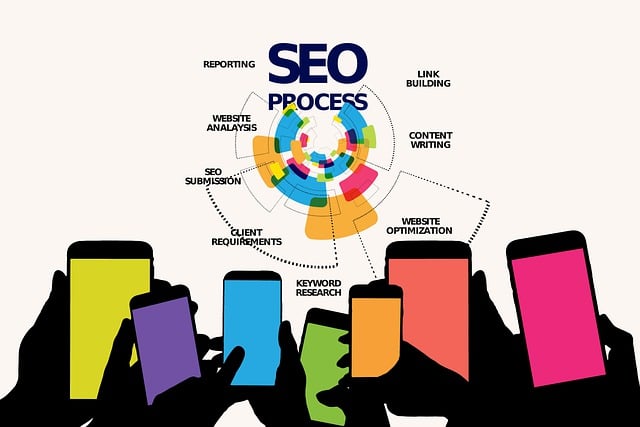At the SEO Summit, professionals gather to unlock digital success through data-driven decisions. The central platform, SEO Analytics Hub, offers a comprehensive view of online performance by integrating keyword tracking, user behavior analysis, and content optimization tools. This transforms complex data into actionable insights, revolutionizing marketing strategies.
The event highlights crucial metrics like organic traffic, bounce rate, and conversion rates as navigation guides in the digital landscape. Keyword research, involving trend awareness, tool usage (e.g., Google Keyword Planner), and competitive analysis, is a strategic foundation for successful campaigns.
Competitor analysis is emphasized as vital for understanding industry dynamics and refining SEO plans. On-page optimization, including content enhancement and structured data markup, improves user experience and search engine understanding. Technical SEO challenges are addressed through tools like Google Search Console to enhance crawlability and site structure.
A robust content strategy, balanced with SEO best practices, engages users and drives organic traffic. Link building through influencer relationships and valuable content attracts high-quality backlinks, boosting rankings. Measuring success using analytics tools tracks key metrics (organic traffic growth, CTRs) for ROI justification, optimizing strategies to align with business goals.
The SEO Analytics Hub is a game-changer for digital strategists, offering an all-in-one platform to unlock unparalleled insights. In this comprehensive guide, we navigate the intricate world of search engine optimization (SEO) through the lens of leading analytics tools. From deciphering core metrics to mastering keyword research and competitor analysis, each chapter provides actionable strategies for SEO Summit dominance. Discover techniques for on-page optimization, technical SEO fixes, content creation, link building, and measuring success – all crucial elements for maximizing your online presence and ROI.
Unlocking Insights: The Power of SEO Analytics Hub

Unlocking Insights: The Power of SEO Analytics Hub
In today’s digital era, understanding your website’s performance is more critical than ever for success at an SEO Summit. This is where SEO Analytics Hub steps in as a game-changer. By providing a comprehensive view of your online presence, it enables folks to navigate a labyrinthine landscape of data and uncover hidden gems. From tracking keyword rankings to analyzing user behavior, this hub offers a symphony of insights that can revolutionize your digital strategy.
Imagine having all the tools you need to enhance, optimize, and transform your website’s visibility in one place. SEO Analytics Hub makes it possible, empowering professionals to make informed decisions promptly. Whether you’re trying to emphasize specific aspects of your content or understand the impact of recent updates, this platform provides a robust tapestry of information that can drive significant results.
Understanding Core Metrics: A Comprehensive Guide

In the realm of digital marketing, understanding core metrics is akin to navigating a bustling city at the peak of a SEO Summit. These metrics are the compass that guides your strategies, enabling you to optimize and refine your online presence effectively. At the heart of it all lie key performance indicators (KPIs) such as organic traffic, bounce rate, and conversion rates—essential elements for any SEO hub. Organic traffic, for instance, reveals the sheer volume of visitors drawn to your site through search engine results, underscoring the effectiveness of your content and keyword strategies.
Bounce rate, another critical metric, signifies the percentage of visitors who exit your site after viewing only one page. A high bounce rate might indicate a need for better site architecture or compelling content that encourages deeper engagement. Conversion rates, on the other hand, measure the success of your SEO efforts in transforming visitors into customers or achieving specific goals. By delving into these core metrics, marketers can gain insights into user behavior, identify areas for improvement, and ultimately enhance their digital strategies, ensuring a vibrant online presence at the next SEO Summit.
Keyword Research: Strategies for Dominance in SEO Summit

In the dynamic landscape of SEO, Keyword Research stands as a cornerstone for any successful SEO Summit strategy. It’s not merely about selecting popular keywords; it’s an art and science that involves understanding user intent, identifying long-tail keywords, and analyzing competition. The best approach integrates tools like Google Keyword Planner, SEMrush, and Ahrefs to uncover hidden gems—keywords with high search volume but less competition. This strategic focus ensures your content resonates with target audiences, driving organic traffic and boosting rankings in the SEO Summit.
Beyond tools, fostering creativity and staying abreast of industry trends are vital. Keep an eye on emerging search patterns, keep up with algorithm updates, and continuously refine your keyword list. Collaboration with subject matter experts can also provide unique insights into user queries, ensuring your keywords are not just relevant but authoritative as well. This holistic approach to Keyword Research paves the way for dominance in the competitive SEO Summit arena.
Competitor Analysis: Gaining an Edge with SEO Tools

In today’s digital era, understanding your competitors’ strategies is crucial for any business aiming to stay ahead in the market. This is where a comprehensive Competitor Analysis becomes an indispensable tool at the SEO Summit. By leveraging advanced SEO tools, businesses can navigate the intricate landscape of online visibility and gain valuable insights into their rivals’ tactics. These tools enable in-depth examination of keywords, backlinks, content strategies, and overall SEO performance, providing a holistic view of the competitive landscape.
With this information, businesses can identify gaps in their own strategies, capitalize on untapped opportunities, and craft more effective plans. It’s not just about outperforming competitors but also about understanding their strengths and weaknesses to build a robust SEO strategy that sets them apart. This proactive approach ensures that companies stay agile and responsive in the ever-evolving digital marketing landscape.
On-Page Optimization: Techniques to Boost Your Ranking

On-Page optimization is a critical component of any successful SEO strategy, and it’s where many professionals begin their journey to summit the rankings. It involves refining your website’s content and structure to align perfectly with search engine algorithms. Techniques such as keyword research and strategic placement are essential; identify relevant keywords that your target audience uses and integrate them naturally into your content. This ensures both relevance and user satisfaction, as visitors land on pages that address their queries.
Additionally, optimizing meta tags, headings, and images plays a pivotal role. Craft compelling titles and meta descriptions that entice users to click while providing clear signals to search engines about the page’s content. Headings structure your content, making it easier for both users and search crawlers to navigate. Images, optimized with alt tags, enhance visual appeal and offer further context to improve accessibility and SEO performance.
Technical SEO: Overcoming Common Website Challenges

Many website owners often find themselves grappling with technical SEO challenges that hinder their online visibility. These issues can range from slow page loading times to complex site structures and broken links. During the SEO Summit, experts emphasized the critical need for businesses to address these problems proactively. By optimizing website performance through tools like Google Search Console and utilizing structured data markup, sites can significantly improve their crawlability and indexation.
A well-organized website architecture is essential to guiding search engine crawlers and ensuring every page has a clear hierarchy. Regular audits and updates can help maintain a healthy site, making it more resilient to changes in search algorithm. The SEO Summit underscored the importance of staying proactive and informed about best practices to overcome these common challenges, ultimately leading to better rankings and enhanced user experiences.
Content Strategy: Creating Engaging, SEO-Friendly Content

In today’s digital landscape, a successful content strategy is paramount for any online presence, and an essential component is creating content that not only captivates but also optimizes search engine visibility. This involves a thoughtful approach at the core of your SEO Summit efforts – crafting engaging, SEO-friendly content that resonates with your target audience. It demands a deep understanding of keyword research to identify phrases that reflect your audience’s queries and incorporate them naturally within compelling copy.
By integrating relevant topics and keywords seamlessly into blog posts, articles, and multimedia content, you enhance the likelihood of ranking higher in search results. This strategy not only drives organic traffic but also fosters user engagement, as well-crafted content encourages sharing and interaction. Thus, it’s about balancing art and science – making content that tells a compelling story while adhering to SEO best practices.
Link Building: Earning High-Quality Backlinks Effectively

Link building is a pivotal strategy in any SEO Summit, as high-quality backlinks remain one of the most influential factors in boosting search engine rankings. The process involves cultivating relationships with reputable websites and influencers within your industry to gain natural, relevant links back to your site. This approach not only enhances your online visibility but also establishes your brand’s authority and credibility.
To build links effectively, it’s essential to create valuable content that naturally attracts backlinks. This could involve producing in-depth guides, conducting original research, or offering unique insights that other websites will want to link to. Additionally, engaging in outreach efforts to relevant industry sites and influencers can help you secure high-quality backlinks. Remember, the goal is to earn links from reputable sources rather than purchase them, ensuring a more sustainable and effective long-term SEO strategy.
Measuring Success: Evaluating SEO Performance and ROI

Measuring success is a pivotal aspect of any digital marketing strategy, and SEO is no exception. At the heart of effective SEO lies the ability to evaluate performance and demonstrate return on investment (ROI). By attending an SEO Summit or leveraging robust analytics tools, marketers gain valuable insights into key metrics such as organic traffic growth, keyword rankings, click-through rates (CTRs), and conversion rates. These data points provide a comprehensive view of a website’s online visibility and its ability to attract, engage, and convert target audiences.
In today’s digital landscape, successful SEO goes beyond mere ranking; it involves driving meaningful interactions and conversions. Therefore, measuring success requires a holistic approach that considers not only top-of-funnel metrics but also the overall impact on business goals. By correlating SEO efforts with sales, lead generation, or other relevant KPIs, marketers can justify investments, optimize strategies, and demonstrate the tangible value of their SEO initiatives to stakeholders.
